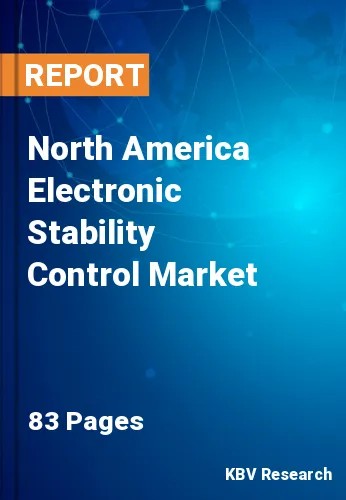The North America Electronic Stability Control Market would witness market growth of 7.7% CAGR during the forecast period (2022-2028).
All ESC makers stress that the system is a safety device to help the driver recover from hazardous circumstances rather than a performance increase or a substitute for safe driving techniques. Because ESC doesn't improve traction, it doesn't allow for quicker turning (although it can facilitate better-controlled cornering). In general, ESC operates within the parameters of the car's handling and the amount of traction that may be achieved between the tires and the road. These boundaries can still be exceeded recklessly, leading to loss of control.
For instance, when hydroplaning occurs, the ESC's efficiency is diminished because the wheels it would employ to stop a skid may lose touch with the ground. Several automobiles feature an override option that enables the system to be partially or wholly disengaged since stability control might conflict with high-performance driving. More straightforward installations sometimes have a single button that may turn off all functionalities, but more complex ones may have a multi-position switch or may never be completely turned off.
Mexico produces over three million automobiles annually, ranking seventh among all passenger vehicle producers globally. 90% of the automobiles made in Mexico are exported. Mexico has 14 manufacturers and assemblers of buses, trucks, tractor trucks, and engines, making it the sixth-largest producer of heavy-duty freight vehicles. Canada's automotive sector is concentrated in the Great Lakes automotive manufacturing cluster, at the center of North America's largest vehicle-producing area. One of the top 12 producers of light automobiles globally is Canada. Five major OEMs construct more than 1.4 million automobiles each year in their Canadian facilities. The regional market would expand as a result of this factor.
The US market dominated the North America Electronic Stability Control Market by Country in 2021, and would continue to be a dominant market till 2028; thereby, achieving a market value of $2,813.1 Million by 2028. The Canada market is poised to grow at a CAGR of 9.8% during (2022 - 2028). Additionally, The Mexico market would witness a CAGR of 9.5% during (2022 - 2028).
Based on Component, the market is segmented into Hydraulic Unit, Sensors and Electronic Control Unit. Based on Vehicle Propulsion, the market is segmented into ICE and Electric & Hybrid. Based on Vehicle Type, the market is segmented into Passenger cars, Light Commercial Vehicles and Heavy Commercial Vehicles. Based on countries, the market is segmented into U.S., Mexico, Canada, and Rest of North America.
Free Valuable Insights: The Global Electronic Stability Control Market is Predict to reach $13.6 Billion by 2028, at a CAGR of 8%
The market research report covers the analysis of key stake holders of the market. Key companies profiled in the report include Robert Bosch GmbH, Continental AG, Johnson Electric Holdings Limited, Aisin Corporation (Toyota Motor Corporation), Valeo SA, Murata Manufacturing Co., Ltd., Hitachi, Ltd., Knorr-Bremse AG, ZF Friedrichshafen AG (TRW), and Mando Corporation (Halla Group).
By Component
By Vehicle Propulsion
By Vehicle Type
By Country
Our team of dedicated experts can provide you with attractive expansion opportunities for your business.

